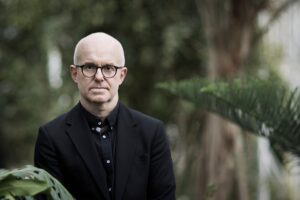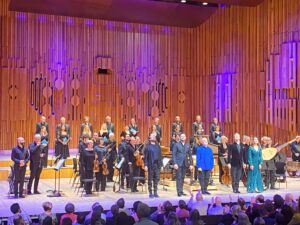Charles Jennens, an erudite nobleman, friend of Handel and author of librettos for several of his oratorios (among them Il Moderato, a stand-alone poem with which he brought together into a unified “morality play” arrangements of Milton’s two poems used in L’Allegro, il Penseroso ed il Moderato), wrote in a letter that he expected Messiah to be a work superior to the composer’s entire oeuvre just as the Anointed himself towered over everything in power and dignity. He compiled the libretto of Handel’s most famous oratorio from verses of the King James Bible and Coverdale Bible, the first printed translation of all Scriptures into English. He took more than half of the text from the messianic prophecies of the Old Testament. A devout Anglican and enemy of deism, Jennens turned his Messiah into an extended reflection on the mystery of Christ, as it were. Each of the three parts of the oratorio focuses on a different aspect of this mystery. In part one the librettist presents the prophecy and fulfilment of God’s plan for the salvation of mankind. In part two – the story of the Messiah’s passion and resurrection. In part three – thanksgiving for his salvific sacrifice.
Handel received the finished text in July 1741, set about writing the oratorio a month later and completed it in mid-September, which did not please Jennens, who was outraged by the composer’s “careless negligence” and his refusal to accept any of the librettist’s comments. Jennens also made no secret of his disappointment that Handel had accepted an invitation from William Cavendish, Duke of Devonshire, to organise a series of charity concerts at the Great Music Hall in Dublin – he had hoped that a work of such weight would be heard for the first time in Englad’s capital. The premiere of Messiah in April 1742 was a great success, and proceeds from ticket sales made it possible to release over a hundred wretched debtors from prison.
Presented a year later at the Covent Garden Theatre, the oratorio was received more coldly primarily for religious reasons. Some argued that theatre was not an appropriate venue for works containing quotations from the Scriptures. Messiah came to be appreciated in London only in the 1750s, when a tradition of annual charity concerts was started in the chapel of the newly established Foundling Hospital for children. From that moment on its popularity continued to grow. It returned to Covent Garden once again before the composer’s death – this time it was greeted with a thunderous applause. Unlike Bach’s Matthew Passion, Handel’s oratorio was not forgotten even for a moment. It changed along with the public’s tastes; new arrangements of the work, not always successful, began to be made already in the eighteenth century – they included Mozart’s version, commissioned by Gottfried van Swieten and compared scathingly by some to stucco on marble. It was more or less in this period that Messiah came to be performed by massive forces, expanded to the point of absurdity over the following half-century (an 1857 concert at the Handel Festival in London featured more than two and a half thousand musicians). The custom of leaping to one’s feet before the “Hallelujah” chorus concluding part two – with its characteristic simple motif in the acclamation, its imitated motet-like structure and references to the Lutheran hymn “Wachet auf” – had become established earlier, supported by a probably made-up anecdote that during the London premiere King George II rose from his seat at the first words of the hymn, prompting the rest of his audience to follow suit. The idea to organise concerts featuring Handel’s Messiah during the Advent season was thought up by nineteenth-century American managers, who rightly assumed that the faithful’s beloved oratorio would ensure a box-office hit for the organisers. Initially, only the first part, supplemented with the obligatory “Hallelujah” chorus, was performed, and only with time were all three parts of the oratorio presented, usually in an abbreviated version and without the da capo passages. The custom of presenting Messiah before Christmas eventually became popular also in Europe, gradually pushing the work out of the standard Lenten repertoire.
Laurence Cummings. Photo: Ben Ealovega
The December concert at the Barbican Hall was led by Laurence Cummings, who conducted the soloists, chorus and orchestra of the Academy of Ancient Music – for the second time since taking over the reins of the legendary ensemble (the first performance was in 2022). Competition in London was, as usual, strong, which is by no means surprising for a work with such a rich and varied performance tradition. Cummings’ responsibility is, however, unusual – that of an heir to the legacy of Christopher Hogwood, founder of the AAM, who in 1979 made the first recording of a complete version of the oratorio on period instruments, a version conceived by Handel prior to its 1754 performance at the Foundling Hospital: with five soloists, a similar instrumental ensemble and the Choir of Christ Church Cathedral, composed of men and boys. Although Hogwood was soon followed by others, his interpretation – clean, clear and refreshing – remained a reference point for several generations to come. Also for Cummings, who opted for a slightly earlier London version, limited the number of solo voices to four and headed ensembles roughly half the size of Hogwood’s: an eighteen-strong mixed choir; an orchestra featuring fourteen strings, two oboes, a bassoon, two trumpets and timpani; as well as a continuo (theorbo, two harpsichords and organ).
Nearly half a century after the first AAM recordings under Hogwood, Cummings’ interpretations can seem cautious, seeking a compromise between the restraint of the pioneers of historically informed performance and the irrepressible verve of musicians from the south of the continent. Nothing could be further from the truth: his Messiah is the fruit of a profound internalisation and reworking of previous concepts, music that is more “human”, better balanced, more wisely contrasted – not only in terms of tempo and dynamics, but, above all, in terms of articulation and overall mood. This was already evident in the first part and the conductor’s completely different approach to the overture – played unhurriedly, at times even ceremonially, in line with the theological message of the work – and then in the rocking, “peasant” Pifa from the beginning of the fourth scene of the oratorio. In addition, Cummings pays much more attention to the words and rhetoric of the text, which can be heard especially in the perfectly thought-out choral passages (from the sparkling, melismatic “And he shall purify” to the ecstatic final “Amen”). Nor is the essence of Handel’s message lost in the instrumental parts: in the overture the orchestra gradually and all the more emphatically moved from heavy gloom to the bright light of hope; the trumpet solo in the third part (the brilliant Peter Mankarious) had not yet lifted the dead from their graves, but had already transformed all the living present in the auditorium; the continuo group in the accompagnato recitatives was sensitively supported by Joseph Crouch (cello) and Judith Evans (double bass).
After the performance at the Barbican Hall. Photo: Damaris Laker
The solo singers were somewhat less homogeneous as an ensemble, partly due to the sudden replacement of the indisposed Louise Alder by Anna Devin in the soprano part. Devin’s voice, golden in tone but with too much vibrato, reached full expression only in opening number of part three, the aria “I know that my redeemer liveth”, sung with admirable finesse and serenity. I have to admit that when it comes to the alto part, I definitely prefer women to countertenors, especially those of the English “old school”, represented by Tim Mead – a singer who is highly musical and impresses with his culture of interpretation, but whose voice is less sonorous than that of the other soloists. Nick Pritchard, on the other hand, was excellent with his soft, beautifully rounded tenor, which enchanted me already in first phrase of the “Comfort ye” recitative. The most “operatic” sound came from Cody Quattlebaum, who has a bass of great beauty, but still not sufficiently stable intonation-wise and sometimes uneven across the registers – although, admittedly, he has a great feel for the theatricality of Handel’s music, which he demonstrated in, for example, the beautifully sung yet unsettling beginning of the aria “The people that walked in darkness”.
This was not a Messiah overpowering with might, exuding power to annihilate all enemies. In these Coverdale’s Great BiblCummings offered us a vision of the Anointed who would grow up from the child fed with milk and honey, leading the calf and the young lion, and playing trustingly near the viper’s den. That is why – although the entire audience rose from their seats at the first notes of “Hallelujah” – I was more moved by the finale of the oratorio, in which I genuinely heard heavens roll up and the world come into being in a whole new form.
Translated by: Anna Kijak


